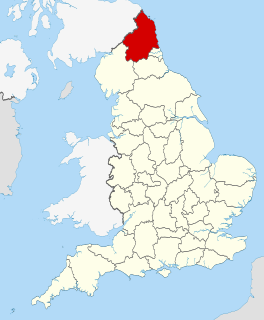
Northumberland is a historic county, ceremonial county and unitary authority in Northern England. The latter has a headquarters at Morpeth and borders east Cumbria, north County Durham and north Tyne and Wear. The historic county town is Alnwick. It and the historic county of Durham are traditionally known together as Northumbria.

Newcastle upon Tyne, often simply Newcastle, is the most populous city and metropolitan borough in North East England. It forms the core of the Tyneside conurbation, the eighth most populous urban area in the United Kingdom. The city is situated on the River Tyne's northern bank, approximately 8.5 mi (13.7 km) from the North Sea.

Tyne and Wear is a metropolitan county in North East England, situated around the mouths of the rivers Tyne and Wear. It came into existence in 1974 after the passage of the Local Government Act 1972. It consists of the five metropolitan boroughs of Newcastle upon Tyne, Gateshead, North Tyneside, South Tyneside and the City of Sunderland. The county is bordered to the north by Northumberland, to the south by County Durham and to the east of the county lies the North Sea. It is the smallest county in North East England by area, but by far the largest in terms of population.

Wallsend, historically Wallsend on Tyne, is a town in the metropolitan borough of North Tyneside in the metropolitan county of Tyne and Wear, North East England. Historically, Wallsend is in the county of Northumberland. Wallsend derives its name from its location at the eastern end of Hadrian's Wall. It has a population of 43,842 and lies 3.5 miles east of Newcastle City Centre. The population of the Wallsend ward of the North Tyneside Borough was at the 2011 census 10,304.

Newcastle University is a UK public research university based in Newcastle upon Tyne, North East England. It has overseas campuses in Singapore and Malaysia. The university is a red brick university and a member of the Russell Group, an association of research-intensive UK universities. It holds the Gold Award in the Teaching Excellence Framework (TEF), one of ten Russell Group universities to achieve the Gold TEF rating.

The Castle, Newcastle, or Newcastle Castle is a medieval fortification in Newcastle upon Tyne, England, built on the site of the fortress that gave the City of Newcastle its name. The most prominent remaining structures on the site are the Castle Keep, the castle's main fortified stone tower, and the Black Gate, its fortified gatehouse.

The Museum of Antiquities was an archaeological museum at the University of Newcastle upon Tyne, England. It opened in 1960 and in 2009 its collections were merged into the Great North Museum: Hancock.

The Great North Museum: Hancock is a museum of natural history and ancient civilisations in Newcastle upon Tyne, England.

Pons Aelius, or Newcastle Roman Fort, was an auxiliary castra and small Roman settlement on Hadrian's Wall in the Roman province of Britannia Inferior, situated on the north bank of the River Tyne close to the centre of present-day Newcastle upon Tyne, and occupied between the 2nd and 4th centuries AD.

The Vallum is a huge earthwork associated with Hadrian's Wall in England. Unique on any Roman frontier, it runs practically from coast to coast to the south of the wall.

The Shefton Museum of Greek Art and Archaeology was an archaeological museum at the University of Newcastle upon Tyne, England, which opened in 1956 and closed in 2008. Its collections are now part of the Great North Museum.

The Hatton Gallery is Newcastle University's art gallery in Newcastle upon Tyne, England. It is based in the University's Fine Art Building.
The Society of Antiquaries of Newcastle upon Tyne, the oldest provincial antiquarian society in England, was founded in 1813. It is a registered charity under English law.

The Natural History Society of Northumbria (NHSN) is a voluntary organization to promote the study of natural history and protect the wildlife of North East England.

The Reverend John Collingwood Bruce, FSA was an English nonconformist minister and schoolmaster, known as a historian of Tyneside and author. He co-operated with John Stokoe in compiling the major song collection Northumbrian Minstrelsy published in 1882
David John Breeze, OBE, FSA, FRSE, HonFSAScot, Hon MIFA is a British archaeologist, teacher and scholar of Hadrian's Wall, the Antonine Wall and the Roman army. He studied under Eric Birley and is a member of the so-called "Durham School" of archaeology. He was a close friend and colleague of the late Dr Brian Dobson.

The Late Shows are a one weekend annual cultural initiative developed in Tyne & Wear since 2007. They are intended to attract new audiences to museums and galleries. They have become the largest programme organised in the United Kingdom for the 'Museums at Night Festival'.
Lindsay Allason-Jones, is a British archaeologist and museum professional specialising in Roman material culture, Hadrian's Wall, Roman Britain, and the presence and role of women in the Roman Empire. She is currently a Visiting Fellow at Newcastle University.

Northumbria is a traditional area of England. It corresponds to or includes the historic county areas of Northumberland and Durham but may also be taken to be synonymous with North East England. A representative provincial flag of Northumbria is registered for the area.




















